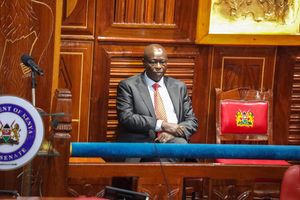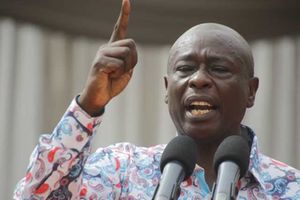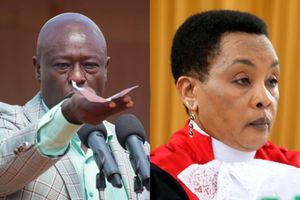
Deputy Chief Justice Philomena Mwilu (left) and former Deputy President Rigathi Gachagua.
The Court of Appeal is set to decide whether Deputy Chief Justice Philomena Mwilu has powers to appoint and assign judges in an expanded bench.
Although the judgment, which is scheduled to be delivered on Friday, involves the impeachment of former Deputy President Rigathi Gachagua, it is expected to have a bearing on another high profile case concerning proposed dissolution of parliament.
The determination will be delivered by a three-judge bench comprising justices Daniel Musinga (President of the Court of Appeal), Mumbi Ngugi and Fred Ochieng.
The judges are expected to address the question of whether the three-judge bench put together by Ms Mwilu in October last year to determine legality of the process used by the National Assembly to impeach the then Deputy President was properly constituted.
DCJ Mwilu appointed a bench comprising Justices Eric Ogolla, Anthony Mrima and Fridah Mugambi to decide the veracity of Mr Gachagua’s impeachment.
The upcoming judgment concerns two separate appeals filed by Mr Gachagua alongside David Munyi Mathenge, Peter Kamotho, Grace Muthoni, Clement Muchiri, and Edwin Munene challenging the High Court’s decision to endorse Ms Mwilu’s move and refusal of the judges to recuse themselves from the case.
According to the appellants, the High Court bench was illegally constituted and, hence, could not sit on the impeachment case.
They believe the power to appoint and assign judges is reserved for the Chief Justice only, hence Ms Mwilu acted illegally. The case raised significant public interest issues.
“The applicant contends that the stated ruling (by the High Court) is based on not only a misrepresentation of Article 165(4) of the Constitution but also a violation of Articles 25, 27, 47, 48 and 50(1) and 260 of the Constitution. The Constitution accords the power to empanel and assign judges to only the Chief Justice. Therefore, the DCJ has no power to assign and empanel judges,” said Mr Gachagua’s lawyers. They believe that the bench appointed by DCJ had no authority to hear the impeachment case.
It was further argued that the High Court’s decision to back DCJ Mwilu, was based on “grave and erroneous misinterpretation” of the Constitution on the administrative roles of the Chief Justice.
However, in the disputed ruling the High Court held that the administrative duties allocated to the Chief Justice by the Constitution could also be handled by the DCJ if the Chief Justice is absent.
“In line with the doctrine of continuity in governance, the drafters of our Constitution were deliberate in ensuring that the administration of duties and application of constitutional provisions remain uninterrupted,” said the bench.
The upcoming judgment could have a bearing to other cases, such as a pending petition on dissolution of parliament. The case involves four petitions filed in 2020 challenging former Chief Justice David Maraga’s advisory to retired President Uhuru Kenyatta on dissolution of Parliament over failure to enact the two-thirds gender rule.
DCJ Mwilu had appointed five judges led by Justice Lydia Achode as the chair of the Bench whose members include Justices George Odunga, James Makau, Anthony Ndung’u and Pauline Nyamweya to handle the petitions.
However, the petitioners, including the National Assembly and Senate, and two voters — Leina Konchellah and Mohsen Munasar — were opposed to the decision of Justice Mwilu to appoint the bench, a duty that is reserved for the CJ.
They argued that the office of the Deputy Chief Justice could not exercise administrative powers conferred on the Chief Justice under the Constitution. The matter is pending determination.
On the key question of whether the DCJ has authority to empanel, the National Assembly pulled two conflicting positions in the two cases. In the Gachagua case it defended the DCJ’s decision while in the other case it protested that Ms Mwilu lacked authority to empanel a bench.







